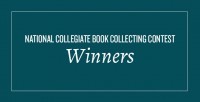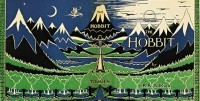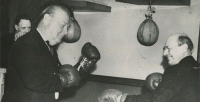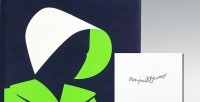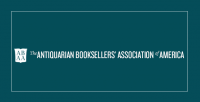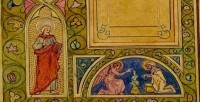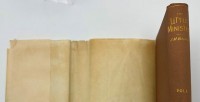The Antiquarian Booksellers' Association of America (ABAA) is delighted to announce the winners of the 2023 National Collegiate Book Collecting Contest: First Prize Ishaan Prasad (Harvard College) for "Confessions of a Former Sheep Thief: Ten Years of Exploration in Typography". Prasad first became interested in typography while designing arcade-style games for the iPhone, which led to a desire to understand the principles and reasoning behind typography and design. Second Prize Joshua Shelly (Duke University) for "Alte Bücher in Haifa: (Re)building a German Jewish Library in the 21st Century". Shelly came to collecting while working on a dissertation on German Zionist literature and became intrigued by the experiences of “a generation that continued to search for solace in the pages of German literature, even while its members packed their bags and set sail for far-off locales in search of refuge.” Third Prize Enrique Vazquez (Yale University) for "Tales of the Midwestern Northwoods". Minnesota native Vazquez grew up exploring the Boundary Water Canoe Area with family; his collection grew as a way to remain connected to the North Woods while being unable to visit. Essay Award Nichole Nomura (Stanford University) for "Classroom Editions of Twain's The Adventures of Huckleberry Finn". Nomura's collection explores the evolving discourses around the teaching of race, the value of prose written in the vernacular, and perceptions of educators' obligations to students through ... [more 2023 NCBCC Winners]
frontpage-carousel
One thing that distinguishes the book collector from the casual reader is a preference for owning first editions. What is a First Edition? A first edition is the format a book took when it was first made available for sale. The ABAA glossary of book terms states: First Edition: “All of the copies printed from the first setting of type; can include multiple printings if all are from the same setting of type.” Collectors distinguish between a first edition (the first printing of a book) and a modern first edition (which more-or-less applies to books printed from 1900 on -- although, the exact definition is open to debate between dealers). What is a First Printing? The first printing is the first batch of books printed from this first setting of type. For a small press, this might be the only printing a book gets, so all copies are first edition, first printings. The ABAA glossary is a master of understatement when it says “Every printed book has a first edition, many never have later editions.” For others, there might be dozens of printings, especially if a book becomes wildly successful. (Witness the recent trend to keep popular young-adult novels -- Veronica Roth's Allegiant and John Green's Turtles All the Way Down, for two examples -- in hardcover for several years, rather than replace the hardcover with a paperback edition a year after first publication.) How Can You Tell if a Book is a First Edition? In general, books before 1900 did not indicate first or subseque... [more Identifying First Editions]
When I hear contemporary politicians invoke Churchill, I usually feel like I'm watching King Louie, the Orangutan who wants to be a man, sing “I wanna be like you” in the 1967 Disney version of The Jungle Book. “You!” sings King Louie, “I wanna be like you I wanna talk like you Walk like you, too” Yeah. Not so much. If you happen to draw a comparison between King Louis and another loud, big-headed, oddly orange, wanna-be-king with impulse control issues and destructive inclinations, well, that's up to you. I refer you to another Disney movie. Cinderella. If the shoe fits… But I digress. “I'm tired of monkeyin' around!” Sure, there's a lot of ways in which most of those who self-flatteringly invoke Churchill fall short. Intelligence. Eloquence, Historical perspective. Foresight. Principle. Conviction. Courage. General capability. But, to me, none of these are the biggest shortcomings of the chorus of King Louie/wannabe Churchills. In my book, here's the most important and most regrettable thing the Louies typically lack – a presumption of shared purpose and the primacy of decency. Churchill could be fiercely partisan and relentless in pursuit of a policy or cause. And he was a true combatant by nature, whether on the battlefield, at the rostrum, on the backbenches, in Cabinet, leading a Government, or leading the Opposition. But Churchill did not confuse mere opponents with actual enemies. He regarded sincerity of convictions that he did not share. He was a... [more Two Pugnacious Personalities]
What's better: a simple author signature, or an inscription? As a longtime bookseller -- a veteran of Borders, Waldenbooks, and independent bookstores -- I thought I knew the answer. But, once I began working for antiquarian booksellers, I discovered the question is much more complex. A comment on the ABAA Facebook page recently asked why some booksellers appear to prefer plain signed books, rather than inscribed ones? While trying to find the answer, I encountered an interesting tale of changing fashions and the dark side of book collecting. The prevailing wisdom in literary circles over the past decade or two has been to ask an author for a plain signature when getting a book autographed (some collectors even purchase two copies, asking the author to inscribe one to them for their 'permanent collection,' and to simply sign their name to the other one, which they will hold onto in the hopes its value appreciates -- sellers of new books have no qualms about endorsing this point of view, although antiquarian booksellers know there is no certainty of modern firsts becoming valuable collectibles, and strongly caution collectors against viewing them as such). To my shame, I've organized and helped run hundreds of book signings and never previously gave this standard advice much thought. inscribed -- a book, or other printed piece, with a handwritten and signed statement usually written for a specific named person(s) and often located on the end paper or title page; when "inscribe... [more Signed Books Vs. Inscribed Books]
Join the ABAA-Public Google Group, a listserv where ABAA members announce select books for sale, share information on their participation in upcoming book fairs, and showcase their recent catalogs! The ABAA-Public Google Group is a read-only email group, so email traffic is kept to a minimum and only ABAA members can announce books for sale — ensuring all items are in full compliance with our Code of Ethics. Subscribers to the group can opt to receive emails individually, or have each day's emails combined into a daily digest to limit the number of emails they receive. Subscribing to the ABAA-Public Google Group You must have a Google Account to subscribe to receive emails from the ABAA-Public Google Group. You can create a Google Account without changing your non-Google email address here. Once logged in to your Google account, you can request to join the ABAA-Public Google Group by clicking the "Ask to Join Group" button. You can also request to be added by writing to hq@abaa.org... More information on Google Groups can be found here. [more Introducing the ABAA-Public Google Group]
ABAA members provide a few pointers for beginning collectors who might be considering attending an antiquarian book fair for the first time. Members Lorne Bair, Michael Hackenberg, and John Windle provide some advice gleaned from decades of book fair attendance. Ask Questions/Develop Relationships with the Dealers Veteran bookseller John Windle notes that "a good, close, trusting connection to a dealer will yield the best possible results," so book fairs present a valuable opportunity to get to know many dealers, and let them get to know you and your interests as a collector. Lorne Bair agrees, adding that his "number one piece of advice to beginning collectors attending their first book fair is to ask questions! Antiquarian booksellers as a rule get very few opportunities to talk about their books with people who are genuinely interested. Book fairs are the one environment where they can open up, share their experience and expertise, and communicate with members of the public who share an enthusiasm for what they do." However, don't mistake the museum-quality artefacts with a museum's explicit invitation to stand around and admire all day. The object of book fairs is to sell books -- how else will the dealers be able to buy more books? Many dealers have traveled a long way to offer their particular treasures at the fair. On the other hand, booksellers are eager to establish relationships with collectors and would-be collectors, and are generally happy to talk books and share... [more Attending Your First Book Fair]
This fascinating blog post about the history of vellum and parchment is written by Richard Norman, an experienced British bookbinder now living in France, where he runs Eden Wookshops with his wife and fellow bookbinder, Margaret, specializing in Family Bibles and liturgical books. The article originally appeared on www.edenworkshops.com, and is reprinted below with the author's permission. --Editor According to the Roman Varro and Pliny's Natural History, vellum and parchment were invented under the patronage of Eumenes of Pergamum, as a substitute for papyrus, which was temporarily not being exported from Alexandria, its only source. Herodotus mentions writing on skins as common in his time, the 5th century BC; and in his Histories (v.58) he states that the Ionians of Asia Minor had been accustomed to give the name of skins (diphtherai) to books; this word was adapted by Hellenized Jews to describe scrolls. Parchment (pergamenum in Latin), however, derives its name from Pergamon, the city where it was perfected (via the French parchemin). In the 2nd century B.C. a great library was set up in Pergamon that rivalled the famous Library of Alexandria. As prices rose for papyrus and the reed used for making it was over-harvested towards local extinction in the two nomes of the Nile delta that produced it, Pergamon adapted by increasing use of vellum and parchment. Writing on prepared animal skins had a long history, however. Some Egyptian Fourth Dynasty texts were written on vel... [more The History Of Vellum And Parchment]
I would like to record any three-deckers with surviving dust-jackets. I have one, and have heard of another, but there probably aren't many more than that. Three-Decker under Canvas. Three-Decker under Paper. A Thomas Hardy three-decker of unknown title is reported to retain remnants of jackets printed with rules and lettering. Does anyone know what title this is, and where it is today? My own three-decker is J. M. Barrie's The Little Minister (London, Paris and Melbourne: Cassell & Co., 1891) in the publisher's fine-ribbed cloth with plain white wove tissue jackets. This copy, described as the finest example extant, sold for $1,100 in 1938, quite a sum during the Great Depression. The plain jackets are definitely original: they exactly match the plain white tissue jacket on another Cassell novel, Robert Louis Stevenson's and Lloyd Osbourne's The Wrecker (1892), whose jacket was even cut short in the same way as the Barrie jackets, a fairly common occurrence then. And on both titles, the jackets have one flap wider than the other, again a common occurrence, at least on British jackets. And another Stevenson novel published by Cassell, Catriona (1893), also has the same white jacket. The uniform paper, cut and fold of all these jackets and the flawless condition of the bindings on three Cassell novels from 1891-92-93 is ample proof that the plain jackets are original. Someone, perhaps a bindery or bookstore clerk, put graphite on The Wrecker jacket to make the title stand out;... [more Jacketed Three-Deckers]
We asked the winners of the 2022 National Collegiate Book Collecting Contest about their collections, and learned about the importance of physical media during the Covid pandemic! First Prize Daria Rose Evdokimova (Harvard University): "Ardis Publishers and the Immigrant Identity." ABAA: Could you give us a brief description of your collection? DRE: My collection focuses on the publishing house Ardis Publishers, the first (and only) US-based publishing house which focused on Russian and Soviet literature. More specifically the majority of my collection consists of Ardis editions of works by Vladimir Nabokov and Joseph Brodsky. Both of these authors were born in Saint Petersburg and eventually immigrated to the US for political reasons. As someone who was exiled from Russia for political reasons as well, I feel a very personal connection to both of these authors. Like them I am also using the acts of reading and writing as attempts to construct a new life in the US. Books printed by Ardis Publishers are a fundamental part of that journey. Frequently immigrants feel that the narratives of their lives become somewhat disjoined, there's a before and after, two islands separated by different languages and cultures. Ardis books were published in the US, by a wife and husband team of American academics, and provided the only outlet for Soviet writers who couldn't be published at home. So for me these books provide the necessary bridge that helps connect two parts of my identity – ... [more Meet the 2022 NCBCC Winners]
After sixty-two years in the field of historical letters and manuscripts, Kenneth W. Rendell still feels just as excited as he was when, many years ago, a friend showed him a handwritten letter of George Washington. He couldn't believe it then and still feels "overwhelmed and honored" to collect what he regards as "pieces of human history." This past year, Rendell established two endowed annual lecture series, the first at the Rare Book School at the University of Virginia, focusing on the excitement of collecting original manuscripts and rare books, and the second at The Grolier Club in New York City, on the importance of handwriting in understanding history. The Grolier Club asked Rendell to deliver the inaugural lecture in this series in October 2022, an illustrated talk about pieces in his personal collection and why he considers them interesting and important: "The Power and Importance of Handwriting." This lecture can be viewed at https://vimeo.com/762624186 Kenneth W. Rendell Lecture on the Importance of Historical Letters and Documents from The Grolier Club on Vimeo. [more Kenneth Rendell Endows Two Lecture Series]


